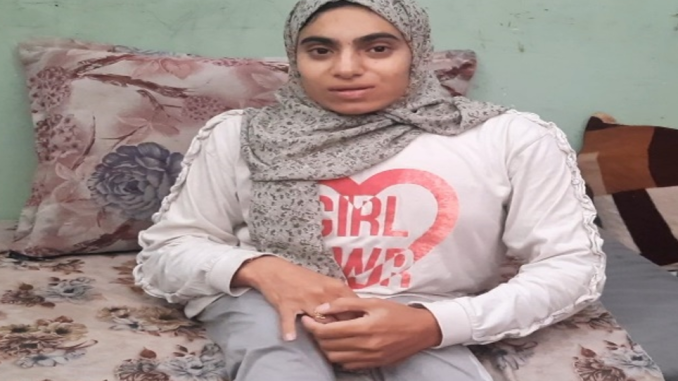
I was like drops of dew (Nada), as my mother used to say: wherever I am, there is rain of joy. This is my name: Nada.
I am 26 years old, and I live in the city of red gold, the neighbor of the sea, the city of Beit Lahiya. Despite my disability, which was caused by a car accident in my childhood, resulting in paralysis in the lower limbs of my body, I fought to live and did not let the disability extinguish the joy of the girl inside me.
I spent beautiful times with my family and loved ones, and I particularly remember my older sister, who was my companion in every moment of my life. I had my own room, my bed, and my belongings that I loved and couldn’t live without.
Then, one day, I woke up to a nightmare called war, where everything was stolen from me, and my most basic right—the right to live in safety—was taken away.
It was a fierce war in which my city was subjected to heavy and continuous bombing. After evacuation flyers were dropped, we were forced to flee to the shelters in Jabalia camp. It was difficult to leave my home, my room, and the place where I had always felt peaceful and secure.
This is when my suffering began, being a person with a disability. I felt like a burden on my family and helpless. We fled under the constant shelling and gunfire from quadcopter drones. At that time, every person wished only to survive with their children, and those who couldn’t escape were killed.
But my sister, my life companion, did not leave me alone. She carried me, put me in my wheelchair, and hurried to take me out of the dangerous place.
After we settled in one of the shelters in Jabalia camp, the bombing intensified, and the school we had sought refuge in was hit. Then, they dropped evacuation flyers, urging us to move immediately to the southern areas of Gaza Valley.
At that moment, I felt deep sadness about my condition and the situation of my family. Fear began to dominate my mind. My family decided to flee to the south, and of course, I went with them.
I sat in my wheelchair, and my sister pushed me. At first, the road was somewhat passable, but when we reached a checkpoint called “Al-Halabat,” where there were Israeli tanks, the road was not suitable for vehicles, and the wheel of my wheelchair broke, causing me to fall on the ground.
The place was crowded, like a scene from the Day of Judgment. In a moment, I was separated from my family, and I felt terrified that they might leave me behind. I sat, screaming and calling out to them, saying, “Don’t leave me, don’t leave me,” until my sister came, carried me on her back, and continued walking.
Eventually, we reached one of the shelters in Deir AlBalah, hoping to find safety. But the management of the center refused to register me or provide me with a suitable place, claiming that the shelter was already full. However, my sister refused to leave because she didn’t know any other places to go. With her persistence, we managed to secure a place in the center.
What happened made me experience incredibly difficult times. I would sit in my tent alone, living my daily life far from the pitying looks I would get from being among people. Some would even utter hurtful words that killed me, such as “What do we need with the disabled here?”
But having my family by my side made me strong, allowing me to overcome everything I heard.
Now, I live my daily life filled with sorrow and deprivation because I have lost the most essential needs of a young woman with a disability.
Due to the blockade imposed by the occupation, there are no goods in the markets, and the items available in Gaza are overpriced, making it impossible for me to buy diapers. The special bags I used for my needs ran out, forcing me to use plastic bags, which were of no help and were also expensive. They also caused my clothes to become soaked in waste, which would come out involuntarily from me. This made me feel like a heavy burden on my sister and her husband, as they had to wash my clothes and clean my body at least two or three times a day.
My sister also struggles to provide me with food due to the high prices and lack of money to buy it. I often have to eat thyme and tahini for breakfast, lunch, and sometimes dinner.
Without a wheelchair, I am confined to my place. I cannot leave, so I remain alone most of the time. I feel sorrow, and it pains me what I am going through. It also hurts that I am separated from my mother, father, and sister. I try to stay in touch with them to make sure they are okay, but the separation is very painful. How I wish this war would end so that we could return to our home, to my warm room, with all my family members. We could eat, talk, play, and rejoice together.
Nada, the displaced woman from the devastated Gaza.

Leave a Reply
يجب أنت تكون مسجل الدخول لتضيف تعليقاً.